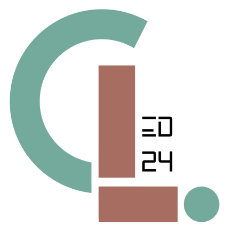|
Descriptif Creativity, Innovation, EthicsFor the 10th time, the young researchers' conference will focus on Creativity, Innovation and Ethics. This scientific meeting is organised by doctoral students from the Cognition, Language, Interaction (CLI) doctoral school at Université Paris 8 Vincennes-Saint-Denis (ED-224). It will take place on Thursday 28th November 2024, in a hybrid format at Université Paris 8 (Maison de la Recherche, room MR002). Creativity, Innovation and Ethics are essential concepts for our times, which is why they have been the subject of a great deal of research in recent years. The University of Paris 8 places creativity and innovation at the heart of its project and its research activities, to which ethics remain essential. These themes are an integral part of humanity and are necessary to respond to current challenges (e.g. ecological evolution, information, R&D). Creativity consists of introducing something new, recognised and validated as such, into a field with established standards. Creativity leads to innovation: the production or improvement of a product or process that differs significantly from previous ones. Innovation can come up against ethical limits, i.e. the need to reflect on values and standards in order to inform individual or collective choices. This conference invites us to reflect on these three complementary concepts - Creativity, Innovation and Ethics - using a wide range of disciplines and methodological protocols. CreativityCreativity refers to the ability to produce something new, with value for a group, in a given context. It requires two criteria: originality, associated with the innovative aspect, and effectiveness, linked to usefulness. Creativity is a complex phenomenon involving multiple levels of analysis, from the study of neural mechanisms to socio-cultural aspects, personality traits, behaviour and the cognitive dimensions of thought processes. The study of creativity and its underlying processes also brings to light the notion of inter-individual differences in the creative process. Creativity is the subject of a great deal of research and has implications for a variety of scientific and artistic disciplines. Recently, the growing popularity of artificial intelligences that generate texts, images and videos, trained on human productions, has brought to the fore important issues such as the very nature of the creative work, the innovative aspect of the creative process, and the need for an ethical stance. This theme invites reflection on questions such as:
InnovationInnovation is the constant search for improvements to what already exists, based on the desire to do better and better. Innovation consists of giving concrete expression to creativity by associating it with value, which embraces esteem, use and the exchange of novelties, and with socialisation, which refers to the conduct of change. Innovation manifests itself in a variety of products, services, technologies, models and practices. Creativity and innovation share common characteristics: they both bring about change and develop ideas. However, there are important differences: innovation is the implementation of the creativity process, a more concrete next step. Creativity changes perception, while innovation transforms reality, bringing about new products or behaviours. This theme raises questions such as:
EthicsEthics is a way of thinking that aims to define norms, limits and duties in a community. New research practices encourage scientists to think about the creative process, innovations and their long-term consequences. Some discoveries are problematic in their own right; others are beneficial but may have negative consequences. The more we modify the environment, the greater the risk of producing undesirable effects at the same time as the desired positive results. The ethical framework may seem to limit creativity and innovation, but creative and inventive ethics can help to overcome these limits, so that research can be conducted in a responsible and sustainable manner. Ensuring the ethical compliance of scientific innovations is essential to maximise their benefits while minimising the risks to society. This theme invites reflection on questions such as:
This call for papers is open to all doctoral students and young graduate researchers from France and elsewhere who are affiliated to a research lab.
Submission guidelinesFor the CLI 2024 conference, papers may be submitted in written or oral form:
Abstracts must be written in French or English and include the following elements:
The poster format must be A0, i.e. 33,&x46,8 inches. The orientation of the poster is optional (horizontal or vertical). The use of illustrations (tables, graphs, diagrams, etc.) is warmly recommended.
Submission platform: https://colloquecli2024.sciencesconf.org/user/submissions Key Dates
30 September 2024 at midnight: Deadline for receipt of anonymised proposals. 1 October 2024: Notification of the Scientific Committee's decisions.
Scientific CommitteeSCHMID Wolfgang - LAGA, directeur ED CLI, Université Paris 8 MILJKOVITCH Raphaële - Laboratoire Paragraphe, DevSENCEA, directrice adjointe ED CLI, Paris 8 BARDIN Brigitte - LAPPS, Université Paris 8 BOUHAI Nasreddine - Laboratoire Paragraphe, CITU, Université Paris 8 DE PLACE Anne-Laure - LAPPS, Université Paris 8 DEMARCHI Samuel – Laboratoire CHArt, Université Paris 8 GUÉRINI Caroline – Laboratoire Paragraphe, DevSENCEA, Université Paris 8 HUGUES Delmas - Laboratoire CHART, Université Sorbonne Paris Nord KAAOUAS Abdellah – LERIC, Université Chouaib Doukkali LAMPROPOULOS Dimitrios - LAPPS, Université Paris 8 QUINIOU Matthieu - Laboratoire Paragraphe, CITU, Université Paris 8 PLANTE-HÉBERT Julien - Laboratoire de phonétique, Université de Québec à Montréal Organising Committee
CHERROUK Leïla - Laboratoire CHArt, CHArt-UPEC, University of Paris 8
|


